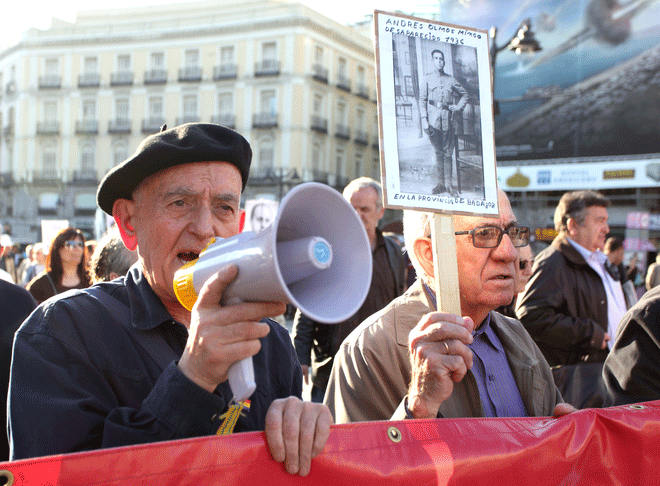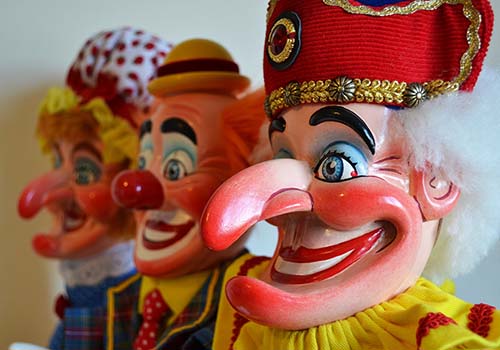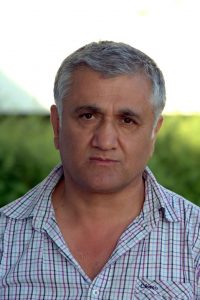16 Oct 2019 | News and features, Spain, Student Reading Lists
The Spanish Supreme Court has jailed nine Catalan separatist leaders for their roles in the independence referendum in 2017, deemed illegal by the Spanish government. Oriol Junqueras, former vice president of Catalonia, was sentenced to 13 years, the highest sentence handed out. A new international arrest warrant for former Catalonia President Carles Puigdemont, who fled to Belgium, has been issued. As protesters clash with police on the streets of Barcelona over the sentencing, Index looks back on the struggle for freedom of expression in Spain and particularly Catalonia, from the last years of General Francisco Franco’s regime, to the present.
Poems from Catalonia vol 1, 2 1972
https://journals.sagepub.com/doi/pdf/10.1080/03064227208532183
Joan Brossa, born in 1919, wrote poetry about Franco’s invasion and destruction of independent Catalonia during the Spanish Civil War (1936-1939). His works are allegories about the bitterness over the cultural repression in Catalonia under Franco. However, the allegories were too transparent to avoid censorship by the Spanish authorities. Index acquired copies of some of the censored poems.

Weekly meeting to remember Franco’s victims in the Puerta del Sol, Madrid [Image credit: NathaliePaco – Demotix]
https://journals.sagepub.com/doi/pdf/10.1080/03064227408532323
The final years of Franco’s regime saw a confused attitude towards censorship. Franco wanted to outwardly present a degree of liberalism to the international political community, while still enforcing censorship inwardly. John Butt argued that this may be why right-wing extremists suppressed artists and thinkers and got away with it; the government allowed these groups to do their dirty work. Vigilantes poured acid over some of Picasso’s works and threw bricks through bookshop windows. The police did not charge them. It was a period of haphazardly applied censorship, creating an atmosphere of insecurity for Spanish writers.
Spanish journalists in jeopardy vol 9,6 1980
https://journals.sagepub.com/doi/pdf/10.1080/03064228008533131
Even in post-Franco Spain, there were significant threats to freedom of expression for journalists. The 1978 constitutional guarantee of press freedom proved to be a formality, not upheld in practice. In May 1980, 60 journalists, writers and artists faced court action, with offenses including “outrage to public morals”. Juan Luis Cebrian, the author of this article, was the editor of the Madrid daily newspaper El Pais. He was sentenced to three months in prison for an editorial, published two years prior in 1978, in which he defended freedom of expression. Read about his experiences here.
Shifting an elephant – freedom of expression in spain today vol 11, 3 1982
https://journals.sagepub.com/doi/pdf/10.1080/03064228208533377
In the first two years after Franco’s death there was excitement about the new democracy, as many newspapers and magazines were set up. But in a bid to pacify Francoists, laws remained in place that allowed journalists to be targeted. Offenses included insult or disrespect to the army and the royal family. In 1977 anti-terrorist legislation was brought in, which failed to define “apology” for terrorism. This left it open to abuse by those wishing to penalise journalists. Read Malcolm Coad’s article from this pivotal point in Spanish history here.
Puppet state vol 46,1 2017
https://journals.sagepub.com/doi/full/10.1177/0306422017703623
Spanish puppeteers Raúl García Pérez and Alfonso Lázaro de la Fuente were arrested in 2016 for glorifying terrorism. The evidence against them was the content of puppet show Pérez and Lázaro de la Fuente were performing as part of carnival festivities in Madrid. The show had included a character holding a banner displaying the name of a fictional terrorist organisation. Lázaro de la Fuente told Index about his experiences following his arrest, and discussed the consequences of performers being persecuted for their art in modern Spain.
No laughing matter vol 46, 2 2017
https://journals.sagepub.com/doi/full/10.1177/0306422017716058
Silvia Nortes explored the reforms the Spanish political party, the Partido Popular, pushed through which allowed the prosecution of comedians, journalists and social media users, quashing their right to freedom of expression. Nortes cites several examples of comedians who have been prosecuted and even jailed. Read their jokes here.
They can’t stop the music vol 46,4 2017
https://journals.sagepub.com/doi/full/10.1177/0306422017748822
Cesk Freixas, a musician and member of Popular Unity Candidacy, a pro-Catalonia independence party, has drawn the attention of the ruling Partido Popular. Unhappy with his strong pro-independence message, they attempted to have his shows cancelled.
Freixas, who performs in Catalan, told Index he has been accused, among other things of “boasting the Catalan language”. Singer-songwriter Albert Pla has also faced discrimination for championing independence for Catalans. Read more about censorship of the independence movement here.
15 Oct 2019 | Europe and Central Asia, News and features, Spain
[vc_row][vc_column][vc_column_text]

Punch and Judy puppets. Credit: Sid Williams / Flickr
Thousands of protesters spilt onto the streets of Barcelona, Spain, yesterday as news of the prison sentences for Catalonia’s separatist leaders spread.
But for those who have been watching Spain’s responses to those who critic or protest against the government over the past few years, the harsh prison sentences will have been less of a surprise.
Strange things have been happening in Spain and few outsiders have been taking notice.
There was the case of the Spanish comedian Dani Mateo who described a monument to former dictator General Francisco Franco as “shit” on a satirical television show and then was accused of “hurting religious feelings” and called before a judge to explain.
Then there were the two puppeteers who were charged after one of the puppets in their Punch and Judy show carried a sign for a made-up terrorist group. The puppeteers were unable to leave the country for weeks, receiving anonymous threats and having to report regularly to the police.
There’s Facu Díaz, who was prosecuted for posting jokes on social media; Cassandra Vera, who was sentenced to a year in prison for making jokes about a former Spanish president; and three women who were accused of a religious hate crime for mocking a traditional Easter procession.
Many of these charges relate to the citizen security law, passed in 2015, which allows the prosecution of journalists for reporting police interventions. Here we have an attack on the right of the public to know what is happening in their own country. That law was passed in parliament with the votes of the conservative Partido Popular, but with no support from other parties.
The 2015 reforms created a range of terrorism offences, but have also been used in the way of security laws throughout the ages to prosecute people that the government didn’t want to speak.
In a piece published in Index on Censorship magazine, Virginia Álvarez of Amnesty International said: “This is not preventing terrorism crimes but allowing the state to act against humorous comments,” she said. “Governments are using the insecurity caused by terrorism to curb freedoms and deactivate social movements.”
For more on how Spain has been cracking down on protest, also read No laughing matter by Silvia Nortes for Index.[/vc_column_text][/vc_column][/vc_row][vc_row][vc_column][vc_basic_grid post_type=”post” max_items=”4″ element_width=”6″ grid_id=”vc_gid:1571135437802-698a9fdb-98b9-9″][/vc_column][/vc_row]
17 Dec 2018 | Europe and Central Asia, Mapping Media Freedom, Media Freedom, media freedom featured, News and features, Spain
[vc_row][vc_column][vc_column_text]

RTVE presenters, together with Begoña Alegría, director of information services
In June 2018 Spain’s then-prime minister Mariano Rajoy was forced out of office in a vote of no-confidence filed by the main opposition party, the social-democratic Spanish Socialist Workers’ Party (PSOE). The right-wing People’s Party mandate had come to an end, and a new government headed by PSOE secretary-general Pedro Sánchez is in power with just 84 seats in a 350-seat parliament. This instability is affecting the reform of public radio and television corporation RTVE while exposing how parties try to control it.
The new government approved the temporary renewal of RTVE’s president and board, which consists of ten directors, six elected by the Congress of Deputies, the lower house of Spain’s parliament, and four by the Senate, the upper house of Spain’s parliament. A two-thirds majority is needed in both houses and four members of the board did not obtain the necessary votes. A tug-of-war between the parties led to the inability to obtain the necessary majority and forced the appointment of journalist Rosa María Mateo as provisional administrator.
On 10 July a public tender to appoint a permanent replacement was approved. The candidates would be evaluated by a committee of experts and ten of them would be elected by the Congress of Deputies and the Senate. The evaluation by the committee will end, at the latest, on 17 December.
In addition to this complex procedure, RTVE’s News Council – the internal body in charge of guaranteeing independence and unbiased information – have been reporting cases of manipulation by political powers in recent years. Between July 2015 and January 2016 the council counted 113 cases of bad practices, Alejandro Caballero, president of the News Council, tells Index on Censorship’s Mapping Media Freedom platform. “In 2016 there were 116 cases. In 2017 the figure skyrocketed to 230.”
Caballero says there is a lack of tools to avoid manipulation before it occurs, and there is also a problem with self-censorship among some of those appointed. “A great part of the experienced editorial team was removed and replaced by editors who were either hired from media outlets with a marked ideological line,” he said, or young, inexperienced people who — in the face of high unemployment rates for journalists — are vulnerable to influence and pressure.
The council’s reports have not been taken into consideration by news services management at anytime between 2014 and 2018, Caballero says. “We have been seen as opponents and our relationship with the president and the board has been purely epistolary.”
In May 2018 representatives of the News Council turned to the European Parliament to claim that the People’s Party government was violating the Charter of Fundamental Rights of the EU and Directive 2010/13/EU, which requires member states to guarantee freedom of information and pluralism of the media. The petitions committee of the European Parliament agreed to send a letter to the Spanish government asking for an explanation.
Caballero points to a specific circumstance that “caused RTVE to move back on the path towards editorial independence. The People’s Party government won the elections in 2011 obtaining an absolute majority and revoked the law that forced the president of RTVE to be elected through consensus between parties (two-thirds of the votes). RTVE became directly dependent on the government”. Now that the two-thirds are required again, Caballero sees grounds for hope. However, “it is necessary to go more deeply to ensure that RTVE’s executives are truly independent”.
On the other hand, changes carried out in RTVE staff since the arrival of Mateo as the provisional administrator have been controversial and even described as a “purge” by a People’s Party spokesperson. Twenty-four hours after the appointment, news services director José Antonio Álvarez was replaced by journalist Begoña Alegría. All the area editors were removed, except for the culture editor. These include Álvaro López (international), Carmen Sastre and José Gilgado (news services), Juan Carlos Roldán (regional centres), Julián Reyes (sports), Luis Javier Alcalá (national), Óscar Gutiérrez (society) and Cecilia Gómez (economy).
As a consequence, more than 50 workers set up the Platform For a Free RTVE in defence of “an authentic free, independent and plural public radio and television” to “avoid abuse and reprisals”. Their manifesto denounces the “unbearable amount of dismissals and appointments” of workers close to the new managers, accusing them of partisan practices.
As reported by online media outlet El Confidencial, soources close to those dismissed are questioning the News Council and blaming it for the changes. Caballero says these claims are false: “The NC has no direct responsibility for appointments. Its responsibility is to inform on the suitability of those appointed to editorial positions. It is an advisory body with no executive authority.”
The quarterly report covering July, August and September 2018 includes only four cases of bad practice. Caballero explains that “cases reported during the last few months are basically mistakes acknowledged by those who made them, rather than the result of manipulative practices”. The previous report documented seventy cases of manipulation and censorship under the former RTVE management.
Nevertheless, as Caballero points out: “It takes time to infer whether those are isolated mistakes. If they are constantly repeated, then we will be in a different scenario.”[/vc_column_text][/vc_column][/vc_row][vc_row][vc_column][vc_basic_grid post_type=”post” max_items=”4″ element_width=”6″ grid_id=”vc_gid:1544612088328-bdb65266-29e0-6″ taxonomies=”199, 7389″][/vc_column][/vc_row]
9 Aug 2017 | Campaigns -- Featured, Statements, Turkey, Turkey Statements
[vc_row][vc_column][vc_column_text]

Hamza Yalçın (Photo: Odak magazine)
The arrest of Turkish-Swedish journalist Hamza Yalçın by Spanish authorities is a gross abuse of the Interpol international arrest warrant system and a brazen attempt to stifle press freedom by Turkey’s president, Recep Tayyip Erdogan. Index on Censorship calls on Spanish authorities to allow Yalçın to return to Sweden.
Yalçın was detained at Barcelona’s El Prat airport on 3 August following an international arrest warrant through Interpol initiated by Turkey.
A day later he was arrested by Spanish police on charges of “insulting the Turkish president” and “terror propaganda” related to an article he wrote for Odak magazine. Yalçın was the chief columnist for Odak and the coordinator for its Training and Solidarity Movement. On 18 March, Turkish prosecutors launched an investigation into Doğan Baran, Odak’s managing editor, and Yalçın for his article entitled The Latest Developments in the Military and the Revolutionary Struggle. Both Baran and Yalçın face charges for “insulting the president” and “denigrating the military.”
“This is a clear abuse of the Interpol system because it is a direct violation of Article 2 of its constitution, which requires respect for fundamental rights and freedoms of individuals. It is extremely concerning that an exiled journalist can be arrested for exercising their right to freedom of expression,” said Hannah Machlin, project manager for Mapping Media Freedom, Index on Censorship’s project monitoring press freedom in Turkey and 41 other European area countries.
The Spanish authorities now have 40 days to decide whether to extradite Yalçın back to Turkey.
“Index demands Spain free Hamza Yalçın and allow him to return to his home in Sweden,” Machlin added.
Yalçın was arrested in 1979 on charges of being linked to the People’s Liberation Party-Front of Turkey (THKP-C) Third Way organization. Odak reported that Yalçın was given two consecutive life sentences by the military junta, which was then in control of the Turkish government, for his “revolutionary activities.” He was granted asylum by Sweden and has lived there since 1984.
Odak magazine, which is campaigning for his release, said in a statement that Yalçın “has been made into a target many times for his articles and values.”
The Council of Europe’s parliamentary assembly published Resolution 2161 in April 2017 on the abuse of the Interpol system. The resolution underlined that “in a number of cases in recent years, however, Interpol and its Red Notice system have been abused by some member States in the pursuit of political objectives, in order to repress freedom of expression.” [/vc_column_text][vc_separator][vc_custom_heading text=”Media freedom is under threat worldwide. Journalists are threatened, jailed and even killed simply for doing their job.” font_container=”tag:h3|text_align:left” use_theme_fonts=”yes” link=”url:https%3A%2F%2Fwww.indexoncensorship.org%2Fcampaigns%2Fpress-regulation%2F|||”][vc_row_inner][vc_column_inner width=”1/2″][vc_column_text]Index on Censorship monitors press freedom in Turkey and 41 other European area nations.
As of 9/8/2017, there were 503 verified incidents associated with Turkey in the Mapping Media Freedom database.[/vc_column_text][/vc_column_inner][vc_column_inner width=”1/2″][vc_column_text]Index on Censorship campaigns against laws that stifle journalists’ work. We also publish an award-winning magazine featuring work by and about censored journalists. Support our work today.[/vc_column_text][/vc_column_inner][/vc_row_inner][vc_separator][/vc_column][/vc_row][vc_row][vc_column][vc_basic_grid post_type=”post” max_items=”12″ style=”load-more” items_per_page=”4″ element_width=”6″ grid_id=”vc_gid:1502284900540-fbb3abe9-4651-4″ taxonomies=”55″][/vc_column][/vc_row]




